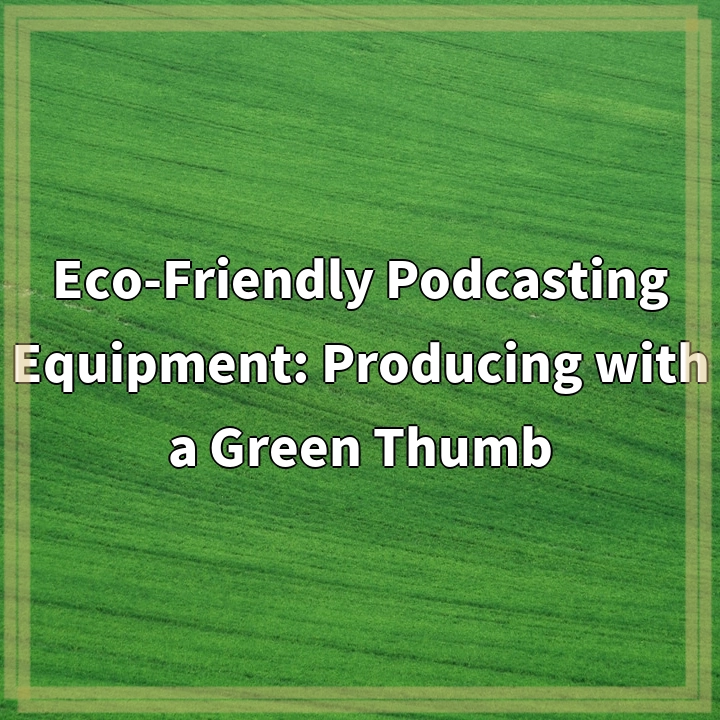
What is Eco-Friendly Podcasting Equipment?
In today’s digital age, podcasts have become a popular medium for sharing information and engaging with audiences. With the growing interest in sustainability and environmental responsibility, many podcasters are now seeking eco-friendly alternatives for their equipment and production processes. Eco-friendly podcasting equipment refers to devices and practices that reduce the negative impact on the environment, such as energy consumption, waste generation, and carbon emissions.
Real-World Problems
While podcasting offers a platform for disseminating valuable content, it also contributes to environmental challenges. The traditional podcasting industry can be quite resource-intensive, leading to various negative environmental impacts. Some of the real-world problems associated with conventional podcasting equipment include:
1. High Energy Consumption
Traditional podcasting setups often involve power-hungry equipment like mixers, amplifiers, and studio monitors, which consume significant amounts of electricity. This high energy consumption contributes to increased carbon emissions and overall environmental footprint. Finding eco-friendly alternatives that are energy-efficient can help mitigate this issue.
2. Electronic Waste Generation
Podcasting equipment has a limited lifespan, and as technology advances, podcasters often upgrade their devices to keep up with evolving industry standards. This frequent turnover of equipment results in the generation of electronic waste, which poses significant environmental and health hazards. Adopting eco-friendly alternatives can reduce e-waste and promote responsible consumption.
3. Harmful Materials and Chemicals
Many traditional podcasting devices contain hazardous materials such as lead, mercury, and brominated flame retardants. Improper disposal of these materials can pollute the environment, contaminate soil and water, and pose risks to human health. Using eco-friendly equipment that is free from harmful substances can help minimize these environmental and health concerns.
4. Carbon Emissions from Production Processes
The production and distribution process of podcasts often involve carbon-emitting activities, such as commuting to studios, shipping equipment, and running servers. These emissions contribute to climate change and air pollution. Implementing eco-friendly practices, such as remote recording, using renewable energy sources, and offsetting carbon emissions, can reduce the carbon footprint of podcasting.
5. Lack of Awareness and Accessibility
One of the challenges in adopting eco-friendly podcasting equipment is the lack of awareness and accessibility. Many podcasters may not be aware of the negative environmental impacts of their equipment choices or may not have easy access to affordable eco-friendly alternatives. Educating podcasters about sustainable options and promoting their availability can help address this issue.
By recognizing and addressing these real-world problems, podcasters can make a positive impact on the environment while continuing to produce engaging and informative content. Transitioning to eco-friendly podcasting equipment offers an opportunity to align the growing podcasting industry with sustainability goals and contribute to a greener future.

Solutions for Eco-Friendly Podcasting Equipment
To address the environmental challenges associated with podcasting, there are several solutions and strategies podcasters can consider:
1. Energy-Efficient Equipment
Opt for energy-efficient podcasting equipment, such as low-power consumption microphones, headphones, and audio interfaces. This helps reduce energy consumption and the carbon footprint of your podcasting setup.
2. Equipment Recycling and Donation
Instead of throwing away old podcasting equipment, consider recycling or donating it to organizations that can repurpose or refurbish the devices. This reduces electronic waste and extends the lifespan of the equipment.
3. Green Hosting and Podcast Platforms
Choose podcast hosting platforms and providers that run on renewable energy sources or have initiatives to offset their carbon emissions. This ensures your podcast episodes are hosted in an environmentally responsible manner.
4. Remote Recording
Embrace remote recording options to minimize travel-related carbon emissions. Conducting interviews and collaborations online can greatly reduce the ecological impact of podcast production.
5. Renewable Energy Sources
Power your podcasting equipment and studio with renewable energy whenever possible. Switching to solar or wind power can significantly reduce the carbon footprint associated with energy consumption.
6. Sustainable Packaging and Shipping
When shipping podcasting equipment or merchandise, opt for eco-friendly packaging materials and choose shipping options with low environmental impact. Consider using recycled or compostable materials to reduce waste generation.
7. Environmental Education and Awareness
Raise awareness about eco-friendly podcasting and educate fellow podcasters and listeners about the importance of sustainability in the industry. Encourage others to adopt environmentally responsible practices and promote the accessibility of eco-friendly equipment options.
By implementing these solutions, podcasters can significantly reduce the environmental impact of their production processes and contribute to a more sustainable podcasting industry. Together, we can create a greener future for podcasting while continuing to share valuable content with our audiences.















